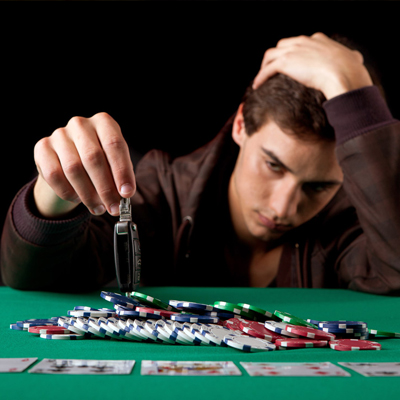Gambling Addiction
Characterization of Gambling Addiction
A behavioral practice where a person impulsively gambles despite of it generating negative consequences in their life is termed as gambling addiction. Just like all process addictions, the problems lies in the reward center of the human brain. A compulsive gambler is drawn to a high they feel when they place a bet –which has parallel effects to the brain as substance use.
The brain is swamped with dopamine and endorphins every time an individual places a frequent gambling bet. Ultimately, the brains changes it pattern depending on the use of chemicals, which causes to make a person feel either happy or satiated. After a few repetitions of dopamine and endorphins the brain no longer feels pleased or content; thus urging the gambler to place a bet again. Regardless of the adverse consequences, a gambling fanatic will keep going after the feeling of high.
Harmful Effects of Gambling Addiction
Gambling is a serious addiction and renders a lot of loss in terms of both finance and assets. Those with severe gambling addictions cannot think rationally and go to extreme extents to manage finances for their bets.
Relationships with dear ones also get stressed with gambling addiction. Individuals tend to borrow money from others, mortgage out assets to fulfil their gambling needs and spin a web of lies to keep things in the unknown. The addiction can also cause individuals to have anxiety pangs, mood swings or depression and keep them away from attending work.
Kinds of Treatments for Gambling Addictions
The two prime kinds of addiction treatment are inpatient and outpatient treatments. Outpatient addiction treatment is meant for those who are in their early stages of addiction and can still perform activities of routine life while attending the treatment sessions a few times a week.
Inpatient addiction treatment involves an individual to live at the residential facility during the process of the treatment. This is highly recommended when they have severe addictions issues and need more intensive care and treatment.
Advantages of Residential Rehab for Gambling Addiction
Some of the important advantages of inpatient treatment for gambling addiction are as mentioned below:
- Residential rehab is away from people or places that could trigger addiction.
- Allows every individual to solely concentrate on recovery.
- Inclusive treatment program with 24/7 care
Being in a residential rehab is a safe sanctuary for gambling fanatics to avail treatment for their fixation. Away from the casinos or racecourses and with limited access to the internet these individuals will totally be able to focus on recovery.
Unlike outpatient treatment where an individual can still be a part of the social circle, inpatients treatments allows individuals to completely focus on recovery. It also includes scheduled group therapy counselling, personal therapy counselling, fitness and mindfulness therapy that are modulated to help keep the clients busy with the activities and rise their chances of a successful long-term recovery.
Selecting the Arya Hospital Neuropsychiatry & Trauma Centre
The Arya Hospital Neuropsychiatry & Trauma Centre is a luxury residential rehab facility that avowals of a private accommodation in a splendid, serene setting amidst nature. Their professional trained counsellors have years of mutual experience in treating addiction and many of them are currently in recovery themselves, implying they are able to pull from personal experience during counselling sessions as well.
Including that we also have an exceptional program completion rate of 96%, and a contemporary, intellectual and universal treatment program that really works.
Time Duration of Gambling Addiction Treatment
The usual time duration of a treatment is 45 days but it also depends on each individual situation and recovery and hence some people may require more time. An initial assessment will help in deciding the time period.
Confidentiality of the Gambling Addiction Treatment
All the treatments at the Arya Hospital Neuropsychiatry & Trauma Centre are downright confidential. Other than the people chosen to be told, there will be no disclosure to anyone else.
Post-process Treatment
Every individual is encouraged to participate in the aftercare program which includes online meetings, contact with the support team when required and yearly reunions to boost more patronage to the community.





